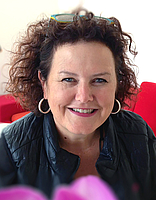Member in Focus
Erin Schuman awarded the Körber European Science Prize

Professor Dr Erin Schuman
Image: privat
The American neuroscientist Erin Schuman has been honoured with the Körber European Science Prize for her research on the mechanics of neurons, which has made her a pioneer in neurobiology. Worth one million euros, this prize is one of the most highly endowed research prizes in the world. Erin Schuman is a department director at the Max Planck Institute for Brain Research in Frankfurt am Main/Germany and has been a Member of the Leopoldina in the Section Biochemistry and Biophysics since 2017.
Erin M. Schuman’s research aims to achieve a better understanding of how the brain and human memory works. She concentrates on the neuronal connections in the nervous system, known as “synapses”. A single nerve cell communicates with sensory cells, muscle cells, gland cells, and other nerve cells via up to 200,000 synapses. These interactions would not be possible without a number of proteins acting as messengers. Erin Schuman was able to show that in nerve cells, unlike in other cell types, these proteins are not only produced in the cell body. From small protein factories (ribosomes) to the necessary information and building plans (messenger RNAs), all the structures required for producing some 250 million protein molecules every day are distributed throughout the nerve cell. Schuman proved there was a particularly high concentration of protein factories near the synapses. Her work shows how nerve cells master their logistics tasks when producing up to 2,000 different messengers: via a decentralised system of protein synthesis in proximity to where protein turnover takes place. This is the only way nerve cells can fulfil their main task: saving information in the form of memory. In the future, Schuman’s foundational research could also be used in the medical field as there are increasing signs that “many brain diseases are ultimately diseases of the synapses,” said Schuman in an interview with the Körber Foundation.
Erin Schuman studied psychology and received her PhD in Neurosciences from Princeton University/USA in 1990. Following postdoctoral training at Stanford University in Stanford/USA she joined the Biology faculty at the California Institute of Technology (Caltech) in Pasadena/USA in 1994 and was also appointed as an Investigator of the Howard Hughes Medical Institute. In 2009 she moved to Europe. Since then she has been a director at the Max Planck Institute for Brain Research in Frankfurt am Main/Germany and a professor at the Goethe University Frankfurt in Frankfurt am Main/Germany and the Radboud Universteit in Nijmegen/the Netherlands since 2015 and 2021, respectively. Erin Schuman is also active in a number of scientific societies and committees, including the Scientific Advisory Board of the Biozentrum (BZ) in Basel/Switzerland, the Institut Jacques Monod in Paris/France, and the NTNU Kavli Institute for Systems Neuroscience in Trondheim. Even before receiving the Körber Prize she had been honoured with various awards, for instance the Brain Prize from the Lundbeck Foundation in Copenhagen/Denmark in 2023 and the Louis Jeantet Prize for Medicine in 2020 from the Louis Jeantet Foundation in Geneva/Switzerland. Schuman is also a member of the American Academy of Arts and Sciences/USA, the National Academy of Sciences/USA, a Foreign Member of the UK’s Royal Society as well as the Academia Europaea and the Leopoldina since 2017.
With the Körber European Science Prize worth one million euros Erin Schuman is now the recipient of one of world’s most highly endowed research prizes. With this prize, the Körber Foundation annually recognises outstanding scientists in Europe for their innovative and promising research in the life and physical sciences. Only last year the computer scientist and Leopoldina member Cordelia Schmid won the Körber Prize and before that multiple Leopoldina members were honoured with the award – including Anthony Hyman (2022), Bernhard Schölkopf (2019) and the later Nobel Prize winners Svante Pääbo (2018) and Stefan Hell (2011).
